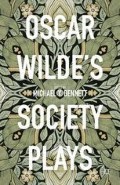Abstract
Oscar Wilde was already a convert to women’s cultural and social causes when he started writing his popular society comedies in the early 1890s. Wilde may not have marched with the suffragettes or given lectures to the National Society for Women’s Suffrage, but he actively supported women’s advances in the arts, culture, and society. As the editor of The Woman’s World, the periodical he helped transform into an “organ of women of intellect, culture and position,” he developed an intellectual playground for women that extended far beyond ladies’ fashion and society gossip to literature, culture, and hot-button issues such as women’s work and female suffrage.1 Wilde expressly solicited the works of contemporary women writers for the magazine, including authors who were or would soon become well known, such as Amy Levy, Ouida, Edith Nesbit, Dinah Mulock Craik, Constance Naden, Michael Field, and Olive Schreiner, and he personally reviewed many lesser-known ones in his editorial “Literary and Other Notes,” such as Margaret L. Woods and Phyllis Browne. Together with his wife, Constance, Wilde also campaigned for women’s rational dress reform throughout the 1880s and 1890s (an interest that merged neatly with his lectures on aesthetic dress and house decoration).2 In addition, he counted numerous progressive women among his correspondents and friends, some of whom, like Sarah Bernhardt and the Ibsen actress Elizabeth Robins, were outspoken advocates of women’s rights.
Access this chapter
Tax calculation will be finalised at checkout
Purchases are for personal use only
Preview
Unable to display preview. Download preview PDF.
Notes
Oscar Wilde to Thomas Wemyss Reid, April 1887, in The Complete Letters of Oscar Wilde, ed. Merlin Holland and Rupert Hart-Davis (New York: Henry Holt and Company, 2000), 297.
Constance Wilde was an early member of the Rational Dress Society (founded in 1881), gave public speeches for the Society starting in 1886, and started editing its Gazette in 1888 (Franny Moyle, Constance: The Tragic and Scandalous Life of Mrs. Oscar Wilde [London: John Murray, 2011], 110).
Regarding Wilde’s revision of the comedy of manners through the combined influences of Victorian farce, the well-made play, and the social problem play, see Sos Eltis, Revising Wilde: Society and Subversion in the Plays of Oscar Wilde (Oxford: Clarendon Press, 1996)
and Petra Dierkes-Thrun, “Aestheticist Comedy of Manners: Oscar Wilde’s The Importance of Being Earnest” in A History of British Drama: Genres, Developments, Model Interpretations, eds. Sibylle Baumbach, Birgit Neumann, and Ansgar Nünning (Trier: Wissenschaftlicher Verlag Trier, 2011), 223–36.
(“Women of No Importance: Msogyny in the Work of Oscar Wilde,” in Wilde the Irishman, ed. Jerusha McCormack [New Haven and London: Yale University Press, 1998], 158–65, esp. 159).
Oscar Wilde, The Importance of Being Earnest and Other Plays, ed. Peter Raby (Oxford: Oxford University Press, 2008), 268, 260. AU society comedies citations refer to this edition.
Angelique Richardson and Chris Willis, “Introduction,” in The New Woman in Fiction and in Fact: Fin-de-Siècle Feminisms, eds. Angelique Richardson and Chris Willis (Houndmills, Basingstoke: Palgrave Macmillan, 2002), 1–38.
Margaret Stetz, “Oscar Wilde and the New Woman,” in Oscar Wilde in Context, eds. Kerry Powell and Peter Raby (Cambridge: Cambridge University Press, 2013), 232.
Oscar Wilde, “The Decay of Lying,” in The Artist as Critic: Critical Writings of Oscar Wilde, ed. Richard Ellmann, repr. (Chicago: University of Chicago Press, 1982), 303.
Kerry Powell, Oscar Wilde and the Theatre of the 1890s (Cambridge: Cambridge University Press, 1990), 73f.
Henry Davray, obituary for Oscar Wilde in Mercure de France (February 1901), trans. Karl Beckson, in Oscar Wilde: The Critical Heritage, ed. Karl Beckson, repr. (London and New York: Routledge, 1997), 237.
Wilde to Robert Ross, April 6, 1897, in The Complete Letters of Oscar Wilde, ed. Merlin Holland and Rupert Hart-Davis (New York: Henry Holt, 2000), 792.
Penny Farfan, “From ‘Hedda Gabler’ to ‘Votes for Women’ : Elizabeth Robins’s Early Feminist Critique of Ibsen,” chapter 1 in Women, Performance, Modernism (Cambridge: Cambridge University Press, 2004), 11–33.
David J Gordon, “Shavian Comedy and the Shadow of Wilde,” in The Cambridge Companion to George Bernard Shaw, ed. Christopher Innes (Cambridge: Cambridge University Press, 1998), 124f
Quoted in Joan Templeton, Ibsen’s Women (Cambridge: Cambridge University Press, 1997).
Quoted in J. Ellen Gainor, Shaw’s Daughters: Dramatic and Narrative Constructions of Gender (Ann Arbor: The University of Mchigan Press, 1991), 33.
Kerry Powell, “New Women, New Plays, and Shaw in the 1890s,” in The Cambridge Companion to George Bernard Shaw, ed. Christopher Innes (Cambridge: Cambridge University Press, 1998), 77.
Quoted in Sally Ledger, “Ibsen, the New Woman, and the Actress,” in The New Woman in Fiction and Fact: Fin-de-Siècle Feminisms, ed. Angelique Richardson and Chris Willis (Houndmills, Basingstoke: Palgrave Macmillan, 2002), 79f.
Petra Dierkes-Thrun, “Incest and the Trafficking of Women in Mrs. Warren’s Profession: ‘It Runs in the Family’,” in English Literature in Transition, 1880–1920, 49 (2006): 293–306.
Henrik Ibsen, A Doll House, in Four Major Plays, vol. 1, trans. RolfFjelde (New York: Signet Classics [Penguin], 2006), 110f.
Toril Moi, Henrik Ibsen and the Birth of Modernism: Art, Theater, Philosophy (Oxford: Oxford University Press, 2006), 317.
George Bernard Shaw, The Philanderer, in Plays Unpleasant, ed. Dan H. Laurence, repr. (London: Penguin, 2000), 99.
Richard Le Gallienne, The Romantic 90s (New York: Doubleday, Page & Company, 1925), 270.
J. P. Wearing, “The London West End Theatre in the 1890s,” Educational Theatre Journal, 29 (October 1977), 328, esp. Table 6.
Oscar Wilde, interview with Robert Ross, St. James Gazette (January 18, 1895), in Oscar Wilde: Interviews and Recollections, ed. E. H. Mkhail, vol. 1 (London/Basingstoke: Macmillan, 1979), 250.
Editor information
Copyright information
© 2015 Michael Y. Bennett
About this chapter
Cite this chapter
Dierkes-Thrun, P. (2015). Wilde’s Comedic Takes on the New Woman: A Comparison with Ibsen and Shaw. In: Bennett, M.Y. (eds) Oscar Wilde’s Society Plays. Palgrave Macmillan, New York. https://doi.org/10.1057/9781137410931_5
Download citation
DOI: https://doi.org/10.1057/9781137410931_5
Publisher Name: Palgrave Macmillan, New York
Print ISBN: 978-1-349-56827-7
Online ISBN: 978-1-137-41093-1
eBook Packages: Palgrave Theatre & Performance CollectionLiterature, Cultural and Media Studies (R0)

